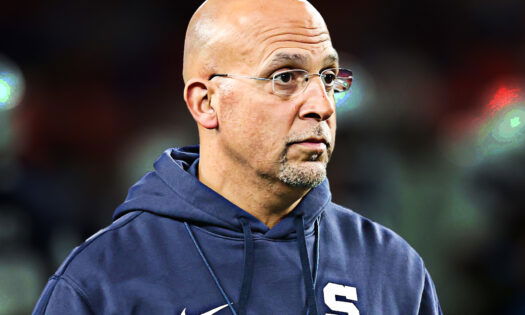Penn State went to the semis of the playoffs last year. During the tenure of their head coach, James Franklin, the story of the Nittany Lions has a lot of ‘almost there.’ A big question mark has been Franklin’s performance against big teams or the so-called ranked teams. That performance isn’t restricted to getting results on the field. Off the field, the same battle has continued, often resulting in defeat on the recruiting front. A big reason has been Penn State’s reluctance to spend.
However, that reluctance, of late, has been sidelined as the program navigates the new reality defined by NIL and the transfer portal. James Franklin and Penn State AD Patrick Kraft have been closely collaborating to define how NIL works within the Penn State program, and their strategy is quite thoughtful and progressive. Franklin and Kraft were able to keep NIL talks in-house for the most part, sidestepping the drama some other programs experience. This allows Penn State to maintain a stable roster, with top players such as Drew Allar and Nicholas Singleton coming back for the 2025 season. Rather than merely viewing it as a disorganized money grab, Kraft refers to it as “marketing dollars” and wishes to create a structure in which players can develop their brands under the umbrella of Penn State’s powerful athletic brand.
Now, all these things are fine, but Franklin seems not to be that okay with this entire ‘arrangement’ or ‘rules’ put down by the CFB. In the Next Up with Adam Breneman show, the host asks James Franklin, “I know you’re having to manage the administration changes at Penn State. How do you feel like it’s changed the most in the last couple of years?”
Franklin replied, “I just think the NIL and transfer portal combination is a beast, right? And for me, I’m still an old school believer in the collegiate experience and what it’s done for both of us and thousands and thousands of people across our country, student athletes.”
James Franklin is good with players getting what they’re due, given the fact that conferences and schools are raking in billions in media rights. Franklin believes that having a more structured revenue-sharing scheme would make for greater stability and clarity. He has not hesitated to criticize how the transfer portal has essentially made college football a transactional monster.
“Penn State program is transformational and not transactional, but I will tell you, like, it’s hard and a little piece of you dies every time a transactional interaction happens,” Franklin said. He pointed out that the lack of rules and guardrails has fostered a sense of free agency, where players constantly weigh their options while coaches manage their rosters like general managers. Franklin emphasizes that there are currently “no parameters,” that don’t serve anyone’s best interests.
It was best seen in the case of Nico Iamaleava. Josh Heupel’s QB1 was to be paid $2 million. However, he wanted more and put pressure on the college by refusing to attend meetings during spring practices. Ultimately, the program had to let him go. All of a sudden, a team was without its QB1.
“If you start treating the players strictly as business, then they’re going to return that in your direction.” Franklin has a point here. He explained that he doesn’t want his program to sacrifice its personal touch just because college football is becoming more commercial and transactional. Franklin says relationships are what keep it all together. You treat players like just another business asset; they’ll begin to act like it, too, and that’s when you lose the culture and trust that make the team special. He’s about finding equilibrium between the emerging realities of NIL and the transfer portal and the fundamental values of positive attitude, work ethic, and authentic relationships.
Penn State’s big defensive bet
James Franklin opted to shell out a chilly $9 million to get Jim Knowles on board at Penn State. You can almost envision Franklin sitting in his office, rubbing his chin, thinking, “If we’re going to make a statement, let’s make it loud and costly.” I mean, $9 million? This is in contrast with the earlier defensive coordinators in Tom Allen, who was good but bailed after his first season. Jim Knowles just won the Buckeyes a national championship. That’s some legacy.
Since Jim Knowles became the defensive coordinator of Penn State, things have surely changed, like moving from a trusty old sedan to a high-performance sports car. Knowles was brought in directly from Ohio State, where his defense was essentially a brick wall that won a national championship, so expectations were through the roof. Penn State’s defense was good to begin with, but Knowles added new ideas while retaining some of the effective old-school. He’s not the loud, gravelly-voiced guy; rather, he’s the one quietly watching from the sidelines, scheming defensive domination.
So yeah, Penn State’s defense got a serious glow-up thanks to Jim Knowles, and honestly, it’s like going from dial-up internet to fiber optic in one night. No more fumbling around or praying the other team forgets how to throw. Knowles brought that Ohio State swagger and that $9 million price tag to go along with it-because nothing says “we mean business” like spending serious money on a defensive genius.
The post James Franklin Forced Into Painful Admission After Penn State HC Breaks Silence on $9M Investment appeared first on EssentiallySports.



